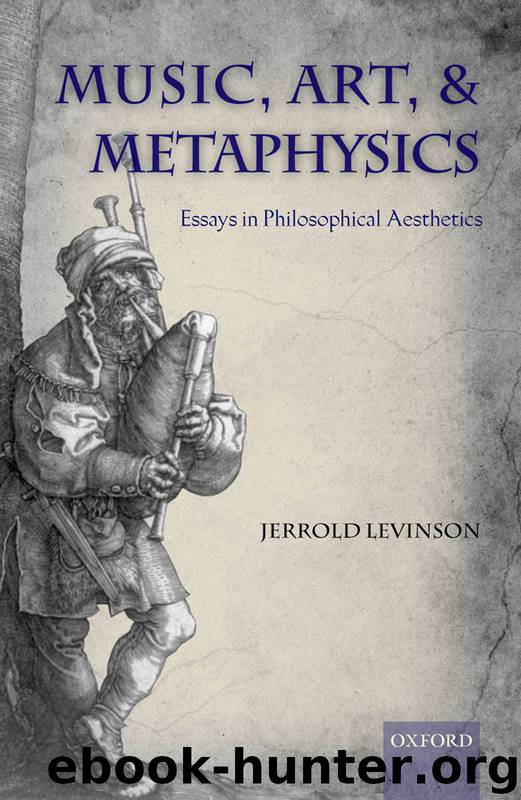Music, Art, and Metaphysics by Levinson Jerrold;

Author:Levinson, Jerrold;
Language: eng
Format: epub
Publisher: Oxford University Press USA - OSO
Published: 2011-05-21T04:00:00+00:00
IX
It’s useful here to bring in a point about evaluation. It seems plain that one can’t evaluate works of music unless one hears them properly. One can’t evaluate the musical worth of Beethoven’s op. 9, say, if it is played by tin whistles, or even by an assortment of proper orchestral winds, if only because part of what we evaluate is how well composers write for the instruments they choose. One is not even entitled to say, from the point of view of judgment, that one has heard a work unless one has heard a substantially correct performance of it—i.e., at least a near in stance. And gross violations of performing means certainly disqualify a performance from that status. Now, can aspects of musical compositions that absolutely must be considered in fairly evaluating them be reasonably excluded from a notion of their essential makeups—of what is integral to them as compositions? It seems perverse to so maintain.
Let me expand on this a bit. “I heard a performance of Beethoven’s op. 9 String Trio on tin whistles” is more like “I saw a reproduction of Van Gogh’s Sunflowers in a magazine” (which, of course, does not entail “I saw Van Gogh’s Sunflowers”) than it is like “I talked to Jack on the telephone” or “I saw Jack on closed-circuit TV” (which perhaps do, respectively, entail “I talked to Jack” and “I saw Jack”). Hearing a performance of Beethoven’s op. 9 with five wrong notes amounts to having heard Beethoven’s op. 9, but hearing a “performance” of the op. 9 on three tin whistles cannot plausibly amount to achieving such acquaintance. Such an auditor could not reasonably claim exposure to the op. 9, and could no more legitimately essay an opinion as to its merit than the skimmer of the magazine above could legitimately assess the quality of the paint handling in Van Gogh’s canvas. Not all performances of a work, and not even all near instances of same, give an auditor aural acquaintance with a work. And this is often because they obscure or delete timbral and instrumental features essential to considered evaluation of a work—features essential to the work as music.
Before we have done, finally, with Kivy’s sustained attack, one point needs reemphasis. There are three factors pushing us toward a more complicated (“qualified Platonic”) view of the paradigm musical work of the last two hundred years, and away from the purity of extreme Platonism. In my assessment, Kivy has failed to impugn the most central of these—fine individuation of works as bearers of distinct sets of artistic and aesthetic properties, beyond what can be ascribed to pure tonal (or sound) structures—and has succeeded only at inducing some qualifications in the force of the other two: personal creatability and instrumental involvement. But taken together, as noted earlier, these considerations are more compelling than taken individually, since they all point in the same direction, a synergy it suits Kivy to ignore in his piecemeal assaults.70
Platonism about standard musical works of the
Download
This site does not store any files on its server. We only index and link to content provided by other sites. Please contact the content providers to delete copyright contents if any and email us, we'll remove relevant links or contents immediately.
| Anthropology | Archaeology |
| Philosophy | Politics & Government |
| Social Sciences | Sociology |
| Women's Studies |
The remains of the day by Kazuo Ishiguro(8965)
Tools of Titans by Timothy Ferriss(8360)
Giovanni's Room by James Baldwin(7315)
The Black Swan by Nassim Nicholas Taleb(7097)
Inner Engineering: A Yogi's Guide to Joy by Sadhguru(6783)
The Way of Zen by Alan W. Watts(6591)
Asking the Right Questions: A Guide to Critical Thinking by M. Neil Browne & Stuart M. Keeley(5751)
The Power of Now: A Guide to Spiritual Enlightenment by Eckhart Tolle(5742)
The Six Wives Of Henry VIII (WOMEN IN HISTORY) by Fraser Antonia(5493)
Astrophysics for People in a Hurry by Neil DeGrasse Tyson(5172)
Housekeeping by Marilynne Robinson(4433)
12 Rules for Life by Jordan B. Peterson(4298)
Double Down (Diary of a Wimpy Kid Book 11) by Jeff Kinney(4257)
The Ethical Slut by Janet W. Hardy(4239)
Skin in the Game by Nassim Nicholas Taleb(4232)
Ikigai by Héctor García & Francesc Miralles(4229)
The Art of Happiness by The Dalai Lama(4120)
Skin in the Game: Hidden Asymmetries in Daily Life by Nassim Nicholas Taleb(3986)
Walking by Henry David Thoreau(3949)
